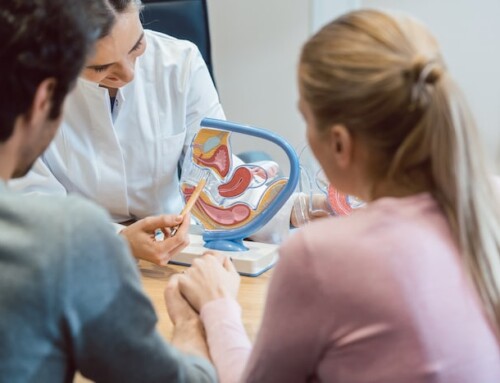Contrary to what many people think, even couples with no fertility issues have only 20% chance of getting pregnant each month that they try to conceive. This actually means that there is an 80% chance of failure. Some of the couples who embark upon building a family achieve pregnancy in the first year of trial, while others may conceive sooner or take much longer.
Couples who are unable to conceive naturally after a year of trying want answers. They want to know the reason for their inability to conceive. Unfortunately, in 20% of the cases, the answer is quite disappointing: unexplained infertility. It is a term used for the instances when science and medicine cannot provide answers for a couple’s causes of infertility, based on current knowledge and advancements in the field. Statistically, there is 1% – 3% chance to get pregnant (per month of trying) with unexplained infertility.
So what can you do if you are diagnosed with unexplained infertility? Shut your dream of starting a family in a box and hide it somewhere out of sight and out of mind? Absolutely not. The best way to defeat an opponent is to know all there is about them. Today we will be doing exactly that for you. We will share important information about unexplained infertility and ways to achieve pregnancy, no matter what you may hear from others.
How is Unexplained Infertility Established ?
Unexplained infertility is usually established when a couple’s standard infertility results (reproductive hormone measurement, semen analysis, HSG (hysterosalpingogram), uterus, and surrounding areas) are normal, after having unprotected intercourse for 12 months.
Diagnostic Testing
Diagnostic testing today can help identify the main reasons why a couple might be facing difficulties in achieving pregnancy. These include poor sperm quality and blocked fallopian tubes, both of which drop your chances for an established pregnancy down to zero. However, the deeper causes of infertility, such as poor egg quality or DNA fragmentation in the sperm, are harder to diagnose.
In-Vitro Fertilisation ( IVF ): A Premium Diagnostic Solution
According to research, couples diagnosed with unexplained infertility that receive no fertility treatment have 1% – 3% chance of conceiving during any month of trying. For that reason, thousands of couples turn to IVF, which is evidenced to be the best option if the couple has experienced three unsuccessful cycles of IUI (Intrauterine Insemination) – a fertility treatment where we separate the more fast-moving sperm (either from the male partner or sperm donor) and place it directly into the uterus (see below for more).
IVF can also be a diagnostic solution as it allows the assisted reproduction expert to observe subtle infertility factors. For example, when we harvest the eggs from a female patient in the Team Miracle laboratory at the Cyprus IVF Centre, we can observe them under the microscope and may find out that their quality is inadequate. This could also be the case even with women with good ovarian reserve. (Ovarian reserve is the capacity of the ovaries to produce eggs that can be successfully fertilised and lead to a healthy pregnancy. Ovarian reserve diminishes as maternal age advances.)
Improper embryo development can also be detected during IVF (in fact, ONLY with IVF; no other treatment or test). So, couples with good quality, mature eggs and fast-moving sperm of good quality too may as well face problems with the development of the embryo. Both of these factors (implantation problems and embryo development issues) can only be detected with IVF, which is one of the reasons why it is the most effective treatment option, even if it does not overcome all causes of infertility.
Testing Procedures for Unexplained Infertility
Advanced testing might help detect a specific cause of infertility. These procedures include:
- pelvic laparoscopy (particularly effective in cases of pelvic pain, endometriosis, fibroids, painful periods, and abnormal HSG)
- pelvic ultrasound (detailed – checking for fibroids and cysts in the ovaries)
- ovarian reserve testing (AMH, FSH blood tests)
- HSG film review (to establish whether the patient has fallopian tube disease, hydrosalpinx, damaged or blocked fallopian tubes)
Combining the results from the pelvic ultrasound and advanced hormone testing, a fertility specialist can diagnose unexplained infertility due to diminished egg reserve; one of the factors of unexplained infertility. In more complex cases of unexplained infertility, though, none of the additional tests and treatment options developed so far are proven effective in identifying the cause.
Recommended Treatment Protocol
To boost your chances of starting a family soon and better manage unexplained infertility, the following treatments are available:
1. Timed Intercourse
Before opting for IVF, Our doctors recommends timed intercourse for a specific period of time, especially for couples whose infertility evaluation is normal.
The treatment can be effective if a follicle that usually contains an egg is ovulated. This can happen naturally while, in many cases, oral medication (Clomid) is required. If the ultrasound shows that a follicle of a decent size is developed, then ovulation is triggered with an injectable medication, or it occurs naturally. About 36 hours after natural ovulation has occurred (or the shot is administered,) you and your partner will be instructed to try to conceive. Right after the timed intercourse, you might need to take daily supplemental progesterone (vaginal capsules) to help prepare the lining of the uterus for the embryo implantation.
Stimulating the ovaries has been one of the best treatment solutions for unexplained fertility impairment in the last two decades or so. The goal is to increase the number of eggs that can reach maturity and be fertilised, and, in turn, increase the probability of pregnancy. In cases when the function of the ovaries cannot be clearly identified, ovarian stimulation is the best course of action.
In the past, patients with polycystic ovarian syndrome (another cause of infertility) were treated with Clomiphene Citrate (CC). However, its efficacy in combating unexplained infertility is under debate at the moment. Nevertheless, timed intercourse is a cost-effective, low-intervention treatment option with minimal side-effects.
Before you make any decision, though, bear in mind that you do run the risk of multiple pregnancy when using Clomid. Plus, we do not suggest you continue the treatment if you did not get pregnant after 5 or 6 ovulatory cycles because the pregnancy rate reduces dramatically afterwards. In this case, it is best to consider alternative options (see below).
2. Superovulation & IUI
In some cases, we might need to focus on increasing the number of eggs that can mature and enabling superovulation (multiple ovulations – many mature eggs produced). We may also need to inject sperm directly into the uterus during ovulation to maximise the chances of pregnancy. For that reason, IUI associated with injectable gonadotrophins is usually one of the first recommended therapeutic solutions to help stimulate the ovarian function. The chances of pregnancy increase from less than 10% to 25% or even 30% after three cycles. Again, the risk of multiple pregnancy is increased, which is why patients considering this treatment should talk with their doctor about this treatment in full detail. That being said, both treatments recommended above give a higher chance of pregnancy (up to 10% per cycle), compared to the chances that couple would have if they tried on their own.
Note: For women in their late 30s or 40s diagnosed with unexplained infertility who are trying to get pregnant, the advantages of this method reduce because there are usually very few quality eggs left in the ovarian reserve at that age. In this case, we advise our patients to consider IVF.
3. Injectable FSH & IUI
It is a more aggressive solution that is recommended for couples that have undergone 3 ineffective therapies with superovulation. This treatment continues for 3-4 cycles, where the patient is administered injectable FSH stimulation followed by IUI (intrauterine insemination). If this also fails, IVF is the ultimate (and most effective) option right now (success rate increases to, at least, 50% per cycle).
4. IVF
The reasons most couples do not get pregnant after 3 or 4 cycles of FSH & IUI is usually because:
- The fallopian tubes cannot pick up the egg successfully
- The embryo transfer to the uterus is deficient
- Fertilisation is impaired (i.e. from sperm motility problems or other male factor infertility issues)
With IVF, all of these factors are eliminated. There are many options available if a couple decide to undergo IVF. For example, at the Cyprus IVF Centre, our doctors offers all cycles of IVF with free Intracytoplasmic Sperm Injection (ICSI), where a single sperm is hand selected by the Team Miracle embryologist and injected into each egg, the combination of which elevates fertilization rates and subsequently your pregnancy rates significantly. The good news is that this particular technique continues to improve, giving us the pleasure to be able to provide this treatment even more effectively.
Another option you can consider is our egg donation programme that allows young, healthy women with proven successful pregnancies in their past to donor their eggs so that another woman can use them to get pregnant. In this case, we fertilise the donor egg with your partner’s sperm and then implant the embryo into your uterus, after a period of 3 to 5 days, depending on the individual case. This raises your pregnancy success rates dramatically (over 70% per cycle).
Finally, you may choose to freeze your own eggs at a young age (this is a proactive step we strongly recommend) and have them implanted when you feel the time is right. Or, alternatively, you may freeze the extra embryos of a cycle and choose to use them when you are ready for a second or third baby!
As for the risk of multiple pregnancy, it is diminished with IVF (regardless of the treatment protocol followed) as we can select only the best embryos to implant.
Based on our own experience at the Cyprus IVF Centre, more than 80% of couples with unexplained infertility are likely to conceive within 12 months if they follow the treatment steps described above, faster if they directly opt to undergo an IVF cycle.
If you are struggling with infertility and you have been diagnosed with unexplained fertility impairment, we are here to help. Please do not hesitate to contact Team Miracle at Cyprus IVF Centre and schedule a free consultation with our doctors, who will review your case and suggest the best treatment protocol and course of action so that you are a step closer to starting your own family, much sooner than you think!






